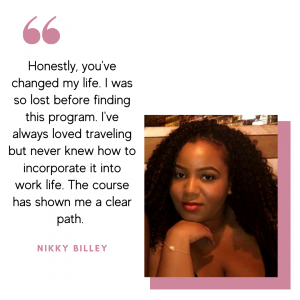Here Are 5 Tips to Know Before Studying Abroad
Written by RTC member Jordan Mehan
Studying abroad is usually the best part of your college experience, but the weeks leading up to your departure can be stressful. Stress is natural, as you’re flying to a totally new place, trying to fit months worth of belongings into two suitcases, or worse, less.
To help ease your worries, we put together our top five tips that you should know before studying abroad!

1. Know some basic phrases in your country’s language.
Although it may seem like English is a language spoken globally, you should never bank on anyone knowing it, especially when visiting a country where English isn’t the first language. It’s important that you learn a few key phrases in your country’s native language before your departure.
Phrases like “Hello”, “Thank you”, and “Where is…” are a few examples of key phrases to practice. Knowing these phrases can help you in a pinch, and locals genuinely like it when you try to speak their language. Apps such as Google Translate, Duolingo, and Memrise can help with practicing and becoming a pro in Italian, French, and more!
2. Know the weather of the country in which you’re studying.
It’s easy to get carried away when packing- I get it, you need to have options. However, when packing all your IG worthy fits, make sure you keep the weather of your new country in mind. For example, if you’re studying abroad in England, you may want to swap your nice, heeled booties for a pair of classic rain boots. I’m not talking about the rainboots with bright polka dots that you wore when you were 5, but a pair of short, black rain boots that can easily go with any outfit. Packing for the weather is honestly the smarter thing to do- no one pays attention to the shows you’re wearing in your IG post anyways.
3. You have to expect, and be okay with, culture shock.
When you first arrive in your study abroad country, you’ll be on a high. You’ll be meeting new people, seeing new places, and trying new food. It’s all so incredible, but after the initial excitement wears off, it’s normal to feel some culture shock. It’s important to remember that culture shock doesn’t always show up in some big way. It can also show up in little ways, like getting frustrated when the grocery store closes way earlier than at home, making it impossible to get there before closing on a weekday. Or, getting upset when the grocery store doesn’t carry any of the brands you like. Little differences in culture can add up and can be hard to handle.
Before you go, try to recognize that this is going to happen- you’re going to feel the differences and experience culture shock at some point. Remind yourself that you have to be okay with it. Stay flexible and try to see the positive. Lean on the new friends you made. Remember culture shock is normal, and you’re allowed to take some time to deal with it. With some time and support, you’ll get through it!
4. Remember to explore your host country.
When studying abroad, you often find yourself on a totally new continent. You’ll want to hit as many countries as possible on that new continent- don’t. Although some of your weekends should be filled with trips exploring surrounding countries, remember you chose your study abroad country for a reason. That’s the country you initially feel in love with (enough so that you decided to move there!), so make sure you really take the time to get to know that country.
Use your weekends to explore your host city’s markets, restaurants and boutiques. Maybe take a few day trips to smaller towns outside the city so you can gain a better understanding of the country’s culture. Maybe find some cooking or dancing lessons to take! These types of trips and experiences enrich your time abroad. Plus, they’re usually cheaper than flying to another country.
5. Become a pro at organization.
This is a big one! When studying abroad, you’ll definitely need a passport, and you’ll most likely need a Visa. Throughout your stay, you’ll have to fill out various documents for the school, trips you want to take, and more. Bottom line- there will be a lot of paperwork. This isn’t just some homework assignment you can throw in your bag and forget about. These are important documents that are allowing you to stay in your host country, so DON’T lose them. I recommend getting a designated folder that you can put all important documents in and finding a safe place to store the folder in your room.
The same goes for all your flights and itineraries. Don’t be laissez faire with stuff like this. Flights cost hundreds of dollars, so make sure you don’t miss it. Making a spreadsheet of your flight times and researching the airports or train stations you’re departing from can ensure a smooth trip. There’s already enough that’s unexpected when studying abroad, so organize the things that you can. You’ll thank yourself later.






